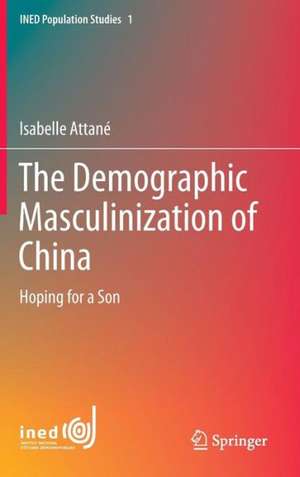The Demographic Masculinization of China: Hoping for a Son: INED Population Studies, cartea 1
Autor Isabelle Attanéen Limba Engleză Hardback – 10 iul 2013
| Toate formatele și edițiile | Preț | Express |
|---|---|---|
| Paperback (1) | 361.03 lei 38-44 zile | |
| Springer International Publishing – 9 iul 2015 | 361.03 lei 38-44 zile | |
| Hardback (1) | 374.37 lei 38-44 zile | |
| Springer International Publishing – 10 iul 2013 | 374.37 lei 38-44 zile |
Preț: 374.37 lei
Nou
Puncte Express: 562
Preț estimativ în valută:
71.64€ • 78.06$ • 60.36£
71.64€ • 78.06$ • 60.36£
Carte tipărită la comandă
Livrare economică 19-25 aprilie
Preluare comenzi: 021 569.72.76
Specificații
ISBN-13: 9783319002354
ISBN-10: 331900235X
Pagini: 216
Ilustrații: XVIII, 198 p.
Dimensiuni: 155 x 235 x 17 mm
Greutate: 0.49 kg
Ediția:2013
Editura: Springer International Publishing
Colecția Springer
Seria INED Population Studies
Locul publicării:Cham, Switzerland
ISBN-10: 331900235X
Pagini: 216
Ilustrații: XVIII, 198 p.
Dimensiuni: 155 x 235 x 17 mm
Greutate: 0.49 kg
Ediția:2013
Editura: Springer International Publishing
Colecția Springer
Seria INED Population Studies
Locul publicării:Cham, Switzerland
Public țintă
ResearchCuprins
Introduction.- Part one: Visible Demographic Discrimination: Chapter 1: Overview.- Chapter 2: Why are there more Boys than Girls?.- Chapter 3: A Geography of Discrimination.- Chapter 4: Discrimination against Girls in Early Childhood.- Chapter 5: Life-Long Inequality.- Appendices: Appendix 1: Maternal Mortality.- Appendix 2: Women and Suicide.- Appendix 3: Female-to-male ratio of Probabilities of Dying in Different Age Groups at a Given Level of Male Life Expectancy at Birth in Various Countries.- Chapter 6: A Phenomenon not Unique in China.- Part Two: A System of Norms and Values that Favours Males.- Chapter 7: The Status of Women in Traditional Chinese Societies.- Chapter 8: Women, Feminism and Femininity.- Appendix: Five Pilot Implementations of the "Care for Girls" Campaign.- Chapter 9: Persistent Social and Economic Disparities.- Chapter 10: Discriminatory Practices and Factors in Masculinization.- Chapter 11: Familial and Socioeconomic Reasons behind Discrimination.- Conclusion: What Demographic Perspectives for China and the World?.- References.
Textul de pe ultima copertă
This book describes the shortage of girls and women in present day China and focuses on two important features: the sex imbalance in childhood and youth, and the excess mortality of women at various stages of their life. The author analyzes the causes and the processes of a strong preference for sons, which generates discrimination toward females and results in a shortage of girls and women. China’s higher proportion of men than women is a population characteristic that is shared by very few countries in the world. This demographic masculinity is unprecedented in the documented history of human populations, both in scale and its lasting impact on the numbers and the structure of the population. Despite the economic boom of recent years, many families in China still consider girls to be less important than boys. Although Chinese women have become largely emancipated since the 1950s, they still do not have the same opportunities for social achievement as men, and Chinese society remains fundamentally rooted in highly gendered social and family roles. As a consequence, Chinese girl babies who have the misfortune to be born instead of a long-awaited son go by various names, such as Pandi (literally "awaiting a son"), Laidi ("a son will follow"), or Yehao ("she'll do too"). The book provides a comprehensive review of the situation of women in China’s society and shows that discrimination against girls and women is part of a system of norms and values that traditionally favours males.
Caracteristici
Addresses exhaustively the issue of demographic masculinisation in China Takes account of the 2010 Chinese census data Provides a comprehensive review of the situation of women in China's society?

















